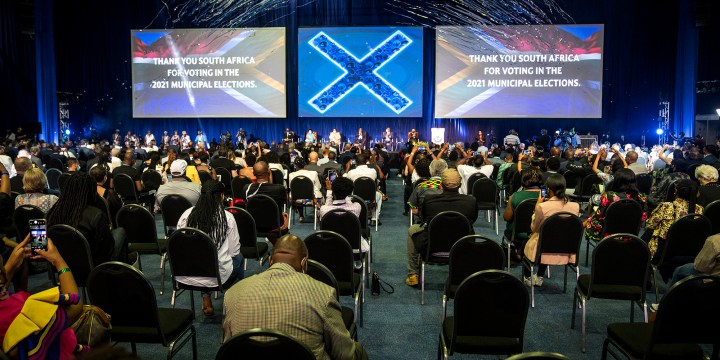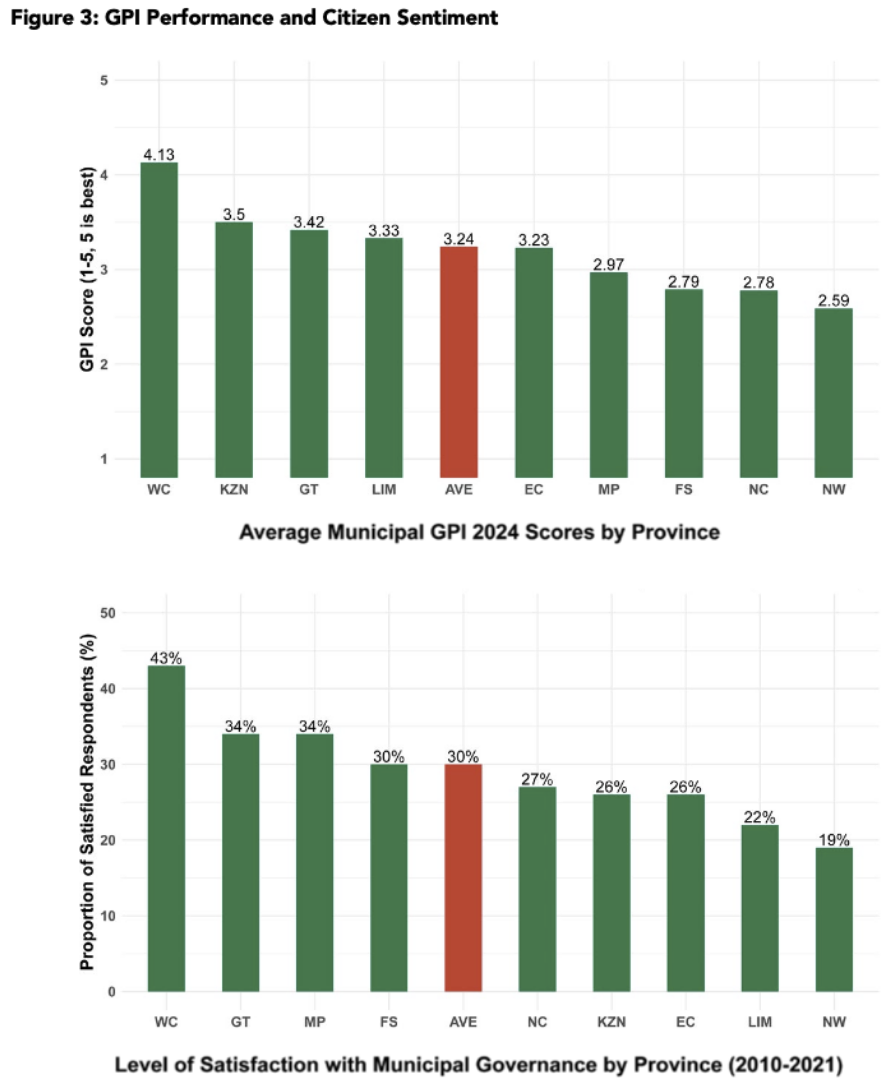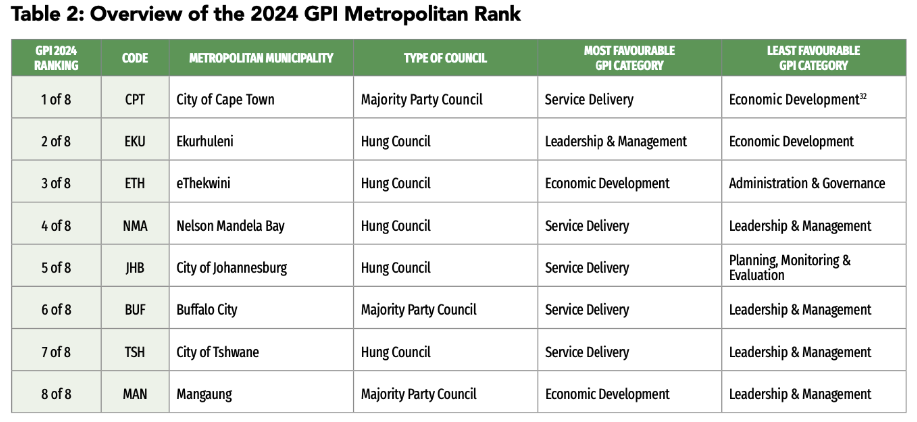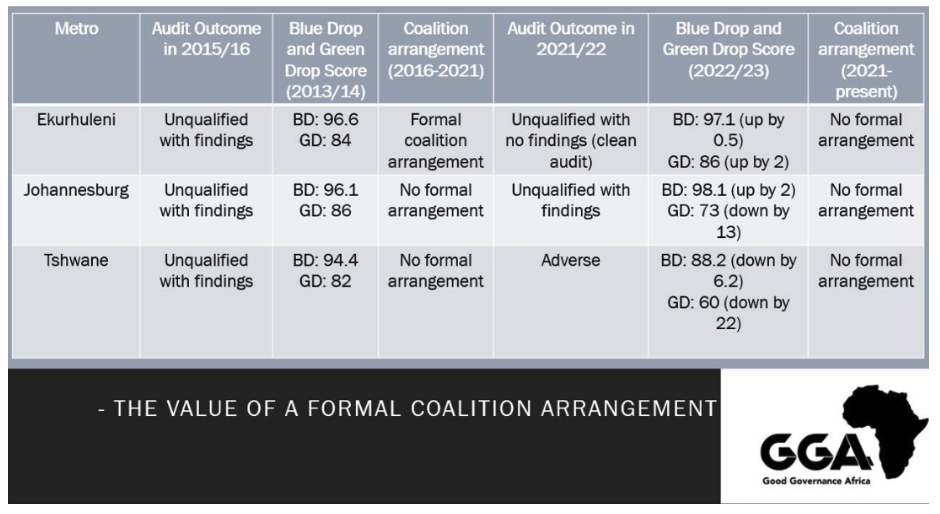BUSINESS REFLECTION
After the Bell: Municipal performance study suggests some coalitions do work

The results are important considering the possibility – or perhaps likelihood – that SA’s next national government may be a coalition.
Research organisation Good Governance Africa has published its latest analysis of the best and worst-performing municipalities for 2024 – and the results throw up an interesting fact: coalitions don’t necessarily result in catastrophe.
In no fewer than 10 of the 20 best-performing municipalities, no single party had an outright majority.
I had a chat with the senior data analyst on the project, Pranish Desai, who told me that this result is somewhat deceptive.
For a start, the number of hung municipalities overall has increased, so it stands to reason that coalition municipalities in both performance categories should increase.
The number of coalition municipalities in the top 10% has more than doubled since the previous report in 2021, which on its own demonstrates the large growth of hung municipalities.
But the number of successful coalition administrations is surprising, considering the awful mess that the Gauteng municipalities have got themselves into with their attempts.
Desai has some interesting ideas about the differences between municipalities that have performed well under coalitions and those that have not, but the results are important considering the possibility – or perhaps likelihood – that SA’s next national government may be a coalition.
It’s crucial to be aware that these results are not survey-based; they are drawn from as many factual sources as Good Governance Africa could dig up.
The organisation generates what it describes as a Governance Performance Index for each municipality, including the metros, based on publicly available assessments. These include reports by the Auditor-General, National Treasury, the Department of Water and Sanitation’s Blue Drop, Green Drop and No Drop reports, and research measuring residents’ satisfaction with their municipality.
Western Cape
It will surprise nobody that the top-performing municipalities are in the Western Cape, but interestingly, this number has increased.
In 2021, 13 out of the top 20 municipalities were in the Western Cape, and are now up by two in the 2024 study. The report finds that Swartland Local Municipality, near Malmesbury, is the best-performing municipality in the country, followed by Drakenstein and Saldanha Bay. All three are in the Western Cape.
This does have to be taken with a little pinch of salt because the Western Cape is the one province where there were no homeland areas during the apartheid era, so they started from a higher base way back when.
And there are contraindications, of course; some regions that were part of the homeland systems are now in the top-performing category, most notably the Winnie Madikizela-Mandela Local Municipality that surrounds Mbizana in the Eastern Cape, which was, in 2016, the lowest-ranking municipality in the country and is now in the top 15%.
Likewise, one of the Western Cape municipalities, Kannaland, has dropped into the bottom 15%, and several others are now middle-ranking.
What is very noticeable is that the problem areas in SA are mostly in North West and Free State.
The other outstanding feature, totally unsurprisingly, I suppose, is that municipal performance and popular attitudes toward municipal authorities as measured by the HSRC are pretty tightly correlated, and importantly, very low across all areas of SA.
Desai tells me that they are much lower than municipalities in other countries in the region and that the level of dissatisfaction also correlates with municipalities in areas where homelands used to exist.

Are things getting better? Well, a little, says Desai. You can see that in improvements in rubbish removal rates, water quality and electricity availability.
Contrary to public opinion, perhaps, the region showing the most advancement is KwaZulu-Natal. But what is not improving, as a general rule, are levels of planning and leadership.
This brings us to what Desai says is the most worrying thing about the latest survey: the state of the metros.
Cape Town came out on top and Mangaung is the worst – no surprises there.
But what is a surprise, perhaps, is that both the worst-performing and best-performing metros are majority-party controlled.
The ranking doesn’t seem to tell us anything definitive about coalition administrations.

But hang on a minute: the big problem lies in the three Gauteng metros.
The second best-performing council is Ekurhuleni and it has a hung council. But what is noteworthy is that the council had a formal coalition arrangement in the 2016 to 2021 period.
Its performance was notably better than Johannesburg and Tshwane, which both had no formal arrangement during that period.
The worrying part is this: since 2021, all three of the metros have had no formal coalition arrangement, and all three are sliding, Desai says.

The moral of the story, I guess, is the most obvious one: coalitions are not necessarily a hindrance to objective service delivery and governance improvement – but it does seem that having a formal, published agreement is at least one identifiable requirement for that to take place.
Let’s hope the national politicians are listening. DM



















A lot went pear-shaped when post-1994 politics became a much bigger issue on local government. Since then, parties view local government as a tool of cadre and policy implementation, instead of viewing local government as first and foremost a job for technocrats.
How many councillors are there today in South Africa versus 30 years ago? What do they cost and what do they actually do week-in and week-out?
So, formal coalition agreements seems to be a contributing factor to better functioning municipalities.
It would be informative to know which parties are more inclined to be in coalitions with formal agreements and which are more inclined to be in coalitions without formal agreements? Or is there no trend?
I think it’s that if there’s a formal agreement in place then all the parties have sat down, decided that they agree on these things, committed to doing certain things, and they have put a signature on a piece of paper which represents a promise to the other parties and to the residents.
In Johannesburg there was a rather unlikely coalition cobbled together in 2021 with Mpho Phalatse put in place as Mayor. Then one of the parties found out about the Mayor’s position on Palestine and decided they could not work with her. Now she’s vulnerable to a no confidence vote.
In rides the PA who say, yes, they’ll join in, but there’s nothing formal in place. They then decide that they will be better placed to acheive their goals or have a say or whatever if they get pally with the ANC and the EFF and then they walk away and Phalatse is exposed again.
If all these parties had signed up for a formal, properly negotiated coalition with certain principles and priorities stated up front then that would likely have been more stable and, and Zille commented on this, they wouldn’t have spent so much time constantly trying to find common ground and would have spent more time on actually running the City.
Should you not take this a step further? Voters should know why some coalitions succeed and not others. Presumably because some parties are more responsible in coalition than others. Why, for example, is it ‘not suprising’ that coalitions have worked best in the Western Cape? Voters facing the real prospect of coalition government ought to know, and vote for, parties most likely to form responsible coalitions, in furtherance of the public interest, not the wreckers who hold coalitions to ransom for their own advantage. .
Yeah, I fully agree. I suspect it’s because the parties involved are not what we expect. In KZN, the ANC and NFP have made good coalition partners. The DA and FF+ also seem to work well.
The best run metro is Cape Town, run by the DA, with 13/20 top municipalities in the Western Cape and the worst is Mangaung, run by the anc. Says it all! Vote for the party that has the best track record. Finish and klaar!
Deserves a closer look. Particularly, what is happening in the Winnie Madikizela-Mandela Local Municipality, in the Eastern Cape, “which was, in 2016, the lowest-ranking municipality in the country and is now in the top 15%.”
Likewise, what is happening in the Western Cape municipality of Kannaland which has dropped into the bottom 15%?
And why are “several others… now middle-ranking” in the Western Cape?
Kamnaland is easy to answer. Minority bunch of crooks called Icosa running things here. We dream of a DA government.
Bang on with Johannesburg. It’s been declining since a minority government took control in 2016.